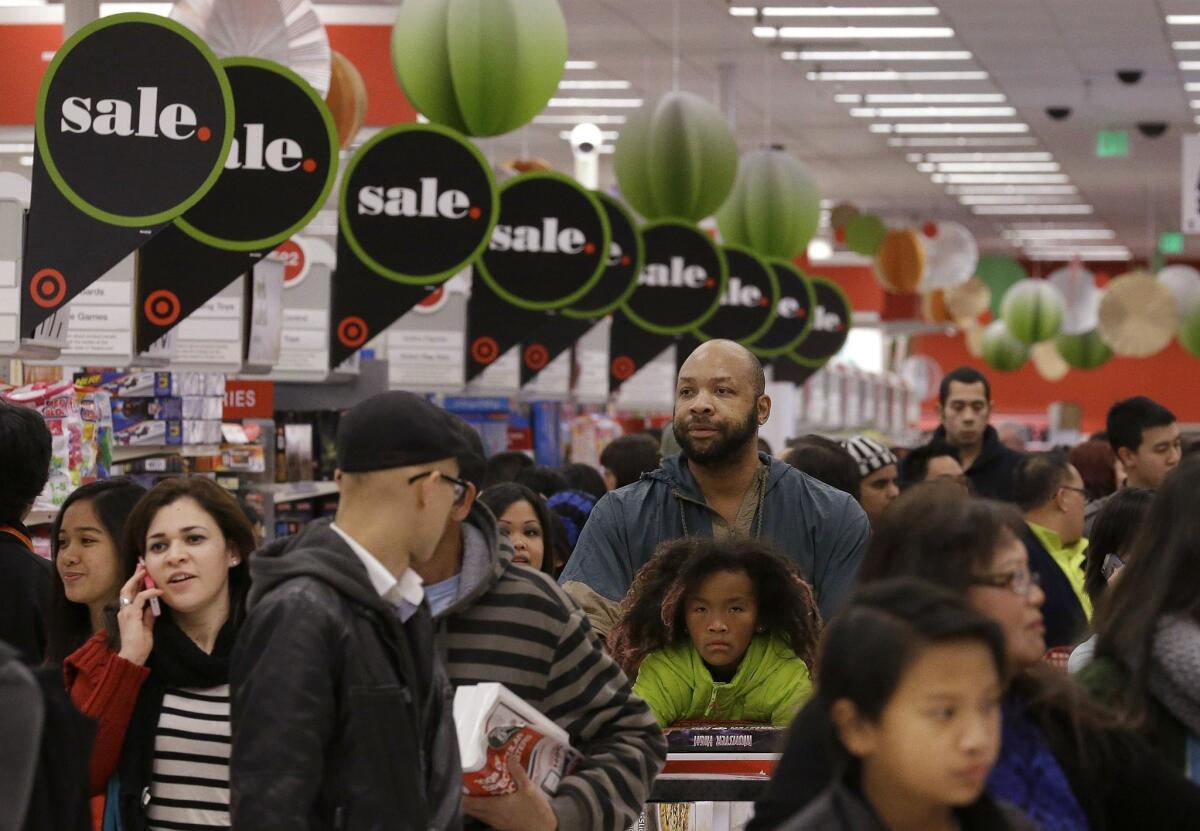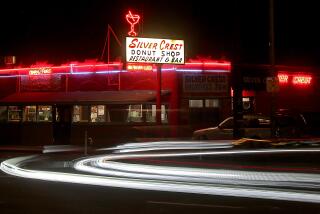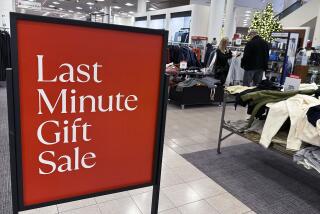Isn’t it time for a shoppers’ strike on Thanksgiving Day?

The only complaint about our commercial habits that has become more frequent than the one about Christmas decorations appearing in stores before Thanksgiving is the one about stores now opening on Thanksgiving.
Most people are well aware of the creeping trend, if not the sheer creepiness of it. Loss-leader sales on “Black Friday” -- the day after Thanksgiving -- became something of a craze starting around 2002, when it became the biggest shopping day of the year, according to retail analysts. Soon the arms race began, with stores moving their Friday door openings back bit by bit into the wee hours of the morning, and finally to midnight Thursday. For many big retailers, the breach into previously sacrosanct Thanksgiving proper occurred in 2011.
Once that happened, the floodgates opened. According to a survey by Mother Jones (see accompanying graphic) several big retailers jumped back to 8 or 9 p.m. -- theoretically after dinner -- but this year have moved further back to 6 p.m.
Retail analyses don’t show a huge clamor among consumers for shopping on Thanksgiving Day or evening. The burden, nonetheless, falls on employees, who are often given little choice but to give up their family time to work. The practice has generated a petition on Change.org urging Target stores to close on Thanksgiving. The petition comes from a store employee in Washington state, who observes that for the last four years, “I usually had to leave in the middle of my Thanksgiving dinner, but this year I won’t be able to attend at all.” Target is opening at 6 p.m. on Thanksgiving; the petition has gathered 100,000 supporters.
For some stores, Thanksgiving Day openings carry the unmistakable stench of desperation. Kmart has persistently been among the earliest openers -- this year its doors swing wide at 6 a.m. on Thanksgiving Day, as they have since 2010. Possibly this is an effort to arrest the chain’s steady decline in same-store sales quarter by quarter, which is bad even in comparison to the performance of its parent’s Sears stores. Or maybe it’s designed to undo the damage caused by a data breach that compromised the account information of some of its customers in September and October.
Another store opening early Thursday is Radio Shack, which in September reported its 10th straight quarterly loss and has been flirting with bankruptcy. The low-priced electronics chain originally planned to be open from 8 a.m. to midnight Thursday. After employees objected, Radio Shack decided to close the stores from noon to 5 p.m., according to a memo reviewed by Bloomberg. The “adjusted schedule,” Chief Executive Joe Magnacca said in the memo, will allow workers to spend some holiday time at home with their families while allowing the chain to “capture the opportunity in the marketplace.”
Some pushback against Thanksgiving shopping has surfaced. Many major retailers abjure Thanksgiving sales -- Costco, Bloomingdale’s, and Nordstrom among them -- and make sure their customers know, often with the assistance of news organizations that spread the word. The “Boycott Black Thursday” page on Facebook had 112,500 “likes” by midday Tuesday.
Plainly, the only thing that will reverse this trend is a buyers’ strike. Empty stores on Thanksgiving Day would send retail executives a crystal-clear message. Or would it? Sales figures for the holiday weekend suggest that to the extent any sales are registered on Thursday, they’re cannibalizing sales on Friday and the rest of the weekend.
Last year, sales for Thanksgiving and Friday combined rose a mere 2.3% over the previous year, according to ShopperTrak data compiled by About.com. That’s a pretty poor return for keeping stores open for as many as six hours on Thursday. On Black Friday itself, the analytics firm said, traffic to physical stores fell 11.4% and retail sales decreased by 13.2% compared to Black Friday 2012. The big gains were in online sales, which tells you that consumers are becoming more enamored of doing any Thanksgiving Day shopping at home and by computer, where it can still be a family event.
So signs of resistance to Thanksgiving Day mall outings are appearing on the horizon. It’s timely to wonder how committed retailers will turn out to be to Thursday sales, giving their obvious expense and the glimmers of customer distaste. Workers hate the trend. Profits are thin; the hassle factor is large.
Wouldn’t it be great if the Kmarts, Targets and Radio Shacks of the world went back to observing Thanksgiving as a family holiday, rather than an opportunity for more crass merchandising? Then we could all go back to complaining about the traditional things, like why Christmas decorations now start appearing in the malls before Thanksgiving. Sorry, did I say Thanksgiving? Nowadays, they start showing up before Halloween.
Keep up to date with the Economy Hub. Follow @hiltzikm on Twitter, see our Facebook page, or email mhiltzik@latimes.com.







